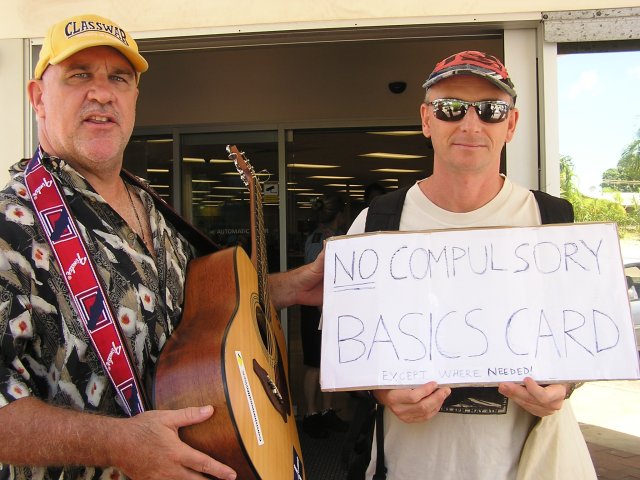
The federal government’s expansion of income management in the Northern Territory has created new barriers for Aboriginal people who want to get off its welfare control scheme.
The rollout has also affected hundreds — possibly thousands — of others, including residents of Darwin and Alice Springs and newly arrived refugees.
“I was put on last November, they sent me a letter saying I fit the criteria,” Rob Inder-Smith, a volunteer carer living in Darwin, told Green Left Weekly. “I’ve been on Newstart allowance for three months and I’m single and have no children, simple as that.”
Minister for Indigenous Affairs Jenny Macklin said in February that the government was planning a three-year “evaluation” of its new phase of income management in the NT — a scheme that can now apply to Aboriginal and non-Aboriginal people.
The February 2 announcement from the government said future expansion to the rest of the country would be informed by the evaluation.
Welfare quarantining — which restricts 50% of Centrelink payments to use at government-approved stores — was originally imposed on Aboriginal people living in 73 “prescribed areas” under the NT intervention.
By mid-2009, 15,125 people in Aboriginal communities and town camps were on the Basics Card.
The government wants to raise the number to 20,000 by mid-2011. The targets are those on unemployment benefits (Newstart) and youth allowance, and parents with young children.
In some child protection cases, the government can take up to 70% of a person’s income. Any lump sum payments, such as payment advances and the baby bonus, will be 100% quarantined.
Inder-Smith rejected Centrelink’s claim that the new scheme targets “vulnerable regions” and “individuals at risk”.
“My friend works just under the 15 hour minimum required each week,” he said. “He works 12 hours a week, in a part-time job. He got his letter last week.
“I was at Woolworths and the woman who checked me out was on the Basics Card, so was her daughter, who gets maybe $20 extra from Centrelink a week. I got a call from a university student who’s on the Basics Card and she isn’t happy about it.
“There’s a Filipino woman who lives around the corner, two teenage sons; she’s rigidly saving money as a part-time seamstress working 15 hours a week. They sent her a letter too, but she managed to talk her way out of it.”
Refugees with protection visas are also finding their income support restricted. Individuals and families released from the Darwin detention centre usually receive Centrelink payments while taking English lessons and studying for qualifications.

In September, the Refugee Council of Australia said the impact of compulsory income management “could be devastating for the well-being and positive settlement of these families” and “will hinder the family’s path to full financial independence”.
Centrelink says that any individual placed on income management could apply for “exemptions” by proving they were fit to manage their own funds. For people with children, the process is especially complicated.
As well as school attendance, immunisation records and health checks, parents need to show their children meet criteria for “participation in early childhood services”.
Aboriginal people still make up at least three-quarters of those on income quarantining.
The Racial Discrimination Act was suspended in the NT when the former Liberal government launched the intervention in 2007.
Every Aboriginal person receiving social security income in the “prescribed communities” became subject to income management, including many elderly people on the pension and disability support.
The Australian said on February 24 that about 60% of people subject to income quarantining under the intervention who were eligible to leave “chose to stay on”.
But despite the new “non-discriminatory” version of income management, the reality is that for most living in remote areas the various so-called exemptions are completely out of reach.
For those living in town camps and communities close to Alice Springs, the process of applying for exemption is degrading and overwhelming.
Barb Shaw, a leader of the Intervention Rollback Action Group and a town camp resident in Alice Springs, told ABC Online on September 27 that elderly Aboriginal people were being pushed to stay on income quarantining.
Inder-Smith said the new scheme has been “rolled out too quickly".
"It’s so widespread, we don’t have the skills or knowledge to get around government legislation," he said.
“I have never been disempowered more than now. I’ve told them everything I can. I’ve asked them to prove I’ve been mismanaging my income. But they just tell me ‘you fit the criteria’.”
The intervention into Aboriginal communities continues with compulsory land acquisition, prohibition, the destruction of Aboriginal-run services and an ongoing lack of any evidence of improvement. Income management still places a discriminatory burden on Aboriginal people.
But others are suffering and the extent of this is yet to be made clear. Income management must be completely opposed and the NT intervention completely repealed.